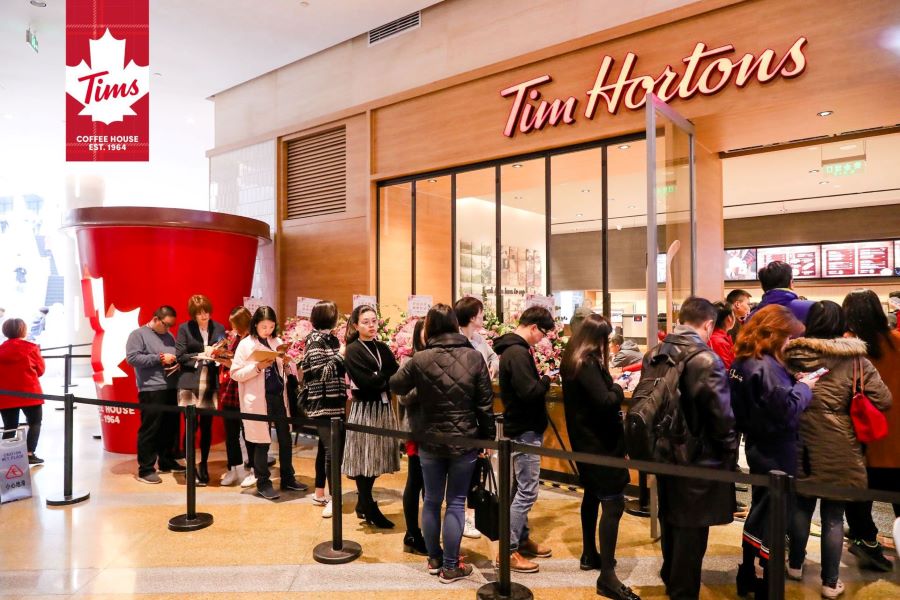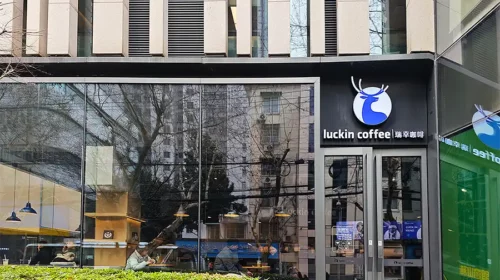Tim Hortons China Brews Up Explosive Growth Plan Using Tech and Localization

The soon-to-be U.S.-listed coffee chain is aiming for 2,750 Chinese stores by 2026, equal to nearly half of Starbuck’s current count
Key Takeaways:
- Tim Hortons China is aiming to open nearly 3,000 stores in China over five years, banking on technology and localization to fuel its rapid expansion
- Company needs to be careful to avoid mistakes of chains like Costa and Krispy Kreme, which closed or sputtered after initially announcing similar major expansion plans
By Doug Young
Fasten your seat belts!
Tim Hortons China, known locally as Tims China, is embarking on a wild ride that will see the Chinese edition of one of Canada’s most famous restaurant brands open nearly 3,000 restaurants in China by 2026, just seven years after it entered the market. The company plans to reach its near-term goal of 2,750 stores through a potent recipe of leveraging technology to open stores quickly and operate them efficiently, combined with heavy-duty product localization and tie-ups with local partners.
The latest step in the company’s China campaign came on July 20, when its registration statement to merge with Silver Crest Acquisition Corp. (SLCR.US), a special purpose acquisition company (SPAC), was declared effective by the U.S. Securities and Exchange Commission. That paved the way for a vote by Silver Crest shareholders, which, if approved, will make Tims China a publicly-listed company on the Nasdaq. Trading is expected to commence on Aug. 22 under the ticker symbol THCH. The company is expected to have a valuation of about $1.4 billion.
Just three years after opening its first store in its hometown in Shanghai, Tims China had 410 stores in China at the beginning of March and announced plans to nearly double that figure by the end of this year. But the road into China is littered with similar massive expansion plans that failed to materialize, often because the chains behind them were too aggressive and ultimately opened stores in less profitable locations with inadequate support in the rush to reach big targets.
Then there’s also the problem of coffee and donuts, the central planks of the original Tim Hortons menu, which are hardly native to Chinese palates. In that regard, China is also littered with chains that failed or are struggling after starting with big plans, including South Korean coffee giant Caffe Bene and Coca Cola’s (KO.US) Costa, as well as U.S. donut favorite Krispy Kreme (DNUT.US).
To put Tims China’s goal of 2,750 stores in perspective, it’s helpful to look at the store counts for some of China’s current restaurant leaders. That group is led by Yum China (YUMC.US), operator of the KFC and Pizza Hut brands in China, which had more than 12,000 stores by the end of June. But Yum came to China way back in 1987 when the market was in its infancy, meaning it has taken more than three decades to reach that level.
Then there’s premium coffee leader Starbucks (SBUX.US), which now has more than 5,700 China stores. But again, the U.S. giant has taken its time reaching that milestone, having entered China more than two decades ago when coffee was still mostly anathema to most Chinese palates.
Tims China thinks it can reach its ambitious goals more quickly in part by learning from the big names that came before it. KFC has led the way in making western-style fast food restaurants familiar to most Chinese diners. Meantime, Starbucks has filled in the coffee-drinking deficit by making the beverage familiar with average Chinese, who now don’t think twice about splashing out more than $5 per cup to show off their stripes as modern urban citizens.
Third-party data cited in a 2021 presentation on Tims China’s plans says China’s coffee market is expected to be worth 157.9 billion yuan ($23.4 billion) in sales next year, and has grown 39% annually between 2013 and 2023. Even after such explosive growth, the average Chinese only drank around 20 cups of coffee in 2020, compared with closer to 700 cups per capita in more coffee-oriented markets like Canada, Germany, Brazil and the U.S. That means there’s plenty of room for more growth.
Tech, localization and partnerships
With all that background in mind, we’ll spend the second half of this space looking at the combination of technology, localization and partnerships that Tims China believes will brew its own unique formula for quick success.
“For store operations, usually we need two years to train a store manager,” Tims China CEO Lu Yongchen told Bamboo Works in an interview, explaining that such managers need to learn everything from forecasting daily sales, to scheduling and managing inventory as part of their jobs.
“But big data can do a much better job at forecasting sales every day, generating orders to warehouses automatically,” he said. “It’s also easy for big data to schedule labor according to sales forecasts. We don’t need our store people to physically check inventory at store level. We can use machines, scales, cameras and other technology to check and manage inventory.”
The company also believes technology will help to quickly build up the customer base it needs to fuel its expansion, with about two-thirds of its business coming from online channels and only a third from in-store orders. Lastly, it also believes technology can help it choose store locations quickly and effectively, partly by working closely with Tencent (0700.HK), one of the company’s investors.
Then there’s localization, which has seen Tims China transform its brand’s core donuts into something most westerners might have difficulty recognizing. That includes using a starchier, chewier base, adding far less sugar than their western counterparts, and then baking – rather than frying – and coating them with fruitier and even savory flavors like salty egg yolk. Hardly your father’s donut.
Last but certainly not least are the partnerships, one with oil and convenience store giant Sinopec (0386.HK), which operates one of China’s largest convenience store chains, and another with Wumart, operator of the German Metro hypermarket brand in China. Tims China is no stranger to such partnerships, since the company itself is a joint venture between controlling shareholder private equity firm Cartesian Capital Group, brand owner and Tim Hortons parent Restaurant Brands International (QSR.US), along with strategic investors Sequoia Capital China and Tencent.
“We are really fortunate to have strong partners at Restaurant Brands International,” Tims China Chairman Peter Yu told Bamboo Works. “They gave us room to build a business that makes a lot of sense for China.”
We’ll close with a few financials for the company, which show how it has not only been growing rapidly but also outperforming its older peers. The company posted revenue of 643.4 million yuan last year, roughly triple the 212.1 million yuan for 2020, according to materials from its registration statement. The company is already profitable on an adjusted EBITDA basis per store, though it doesn’t expect to turn profitable for adjusted EBITDA on a company-wide basis until 2023.
The company also posted a 3.4% same-store sales increase in this year’s first quarter, in sharp contrast with the 8% decline for Yum China and other major chains that suffered from pandemic-related store closures starting in March. Nobody in China did well during the second quarter due to widespread lockdowns, including a two-month lockdown of Shanghai in April and May. But Lu noted Tims China was allowed to resume some operations from its Shanghai base as early as mid-April, and added the company has seen a “very good recovery of business” since July.
The Bamboo Works offers a wide-ranging mix of coverage on U.S.- and Hong Kong-listed Chinese companies, including some sponsored content. For additional queries, including questions on individual articles, please contact us by clicking here.
To subscribe to Bamboo Works free weekly newsletter, click here






